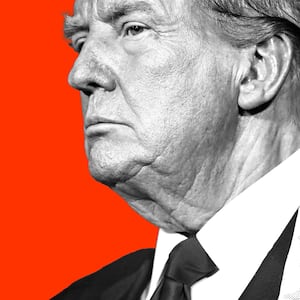The New York attorney general on Thursday questioned whether the company that swooped in to post a $175 million bond for former President Donald Trump is actually good for the money—or is even allowed to operate in the state.
The aggressive move by AG Letitia James came after Knight Specialty Insurance Company—a relatively unknown entity with tangential political connections to the former president—was forced to reveal its finances.
Lawyers for the law enforcement office made a court filing that “hereby takes exception to the sufficiency of the surety,” noting that KSIC is trying to operate “without a certificate of qualification.” Under New York law, state regulators have certain standards to ensure that an insurer is “solvent, responsible and otherwise qualified to make policies or contracts of the kind required.”
ADVERTISEMENT
The AG has given Trump and his rescuers 10 days to, as government lawyers put it, “justify the surety.”
What’s more, the additional scrutiny has called into question whether this insurance company even has enough money to meet the capital requirements for posting the bond.
On Thursday, Trump’s lawyers posted paperwork listing the finances behind two companies—Knight Specialty Insurance Company and another entity named Knight Insurance Company LTD—which together claim to have assets totaling $2.7 billion. However, only the first of those two is actually listed in the court documents as agreeing to front the money if Trump loses the case.
Knight Specialty Insurance Company alone doesn’t have the “surplus” listed in financial statements to meet the capital requirements for posting the bond. New York law limits how much money state-regulated surety companies can post on a single bond to 10 percent of what’s referred to as the firm’s total “capital and surplus.”
In a midday court filing, the Knight Speciality Insurance Company revealed that it currently only has $138 million in “surplus.” That means the bond it has decided to post for Trump smashes through the 10 percent barrier, topping a whopping 127 percent of the company’s dedicated reserves.
But just before the new paperwork was filed, Knight Specialty Insurance president Amit Shah told CBS that the company has a novel theory as to why the state capital requirements don’t apply to their firm: because Knight Insurance isn’t even registered to operate as a surety in New York.
"Knight Specialty Insurance Company is not a New York domestic insurer, and New York surplus lines insurance laws do not regulate the solvency of non-New York excess lines insurers," he told CBS.
It’s unclear what happens now, but Trump owes $464 million to the New York Attorney General’s office after AG Letitia James and her investigators proved at a recent trial that the real estate tycoon had committed bank fraud by lying incessantly about the value of his properties for more than a decade. The judgment is on appeal, and Trump has managed to halt dramatic property seizures of his Westchester County Seven Springs estate north of New York City by posting a bond—in other words, getting a surety company to promise it’ll pay if he loses the case.
State insurance regulators limit how much money a surety company can promise to pay, given the risk inherent in suddenly owing a huge sum. It’s akin to the way financial regulators keep banks solvent: by stopping them from overleveraging themselves.
Thursday’s filing raises serious questions about the risk to New York state. Knight Specialty’s “capital and surplus” has remained even lower than its current $138 million in the past four years, according to an assessment by a government-created Texas nonprofit that tracks these types of figures. Knight Specialty had $57 million available in 2020, $80 million in 2021, and $101 the following year, according to the Surplus Lines Stamping Office of Texas.
The explanation that Knight Specialty Insurance isn’t subject to the capital requirements because it’s not a New York company subject to the state’s solvency rules raises even more questions as to why Trump would opt for a firm that isn’t even licensed by New York’s Department of Financial Services.
Shah, the Knight Specialty Insurance president, also asserted to CBS that his company has more than $1 billion in “equity,” though the financial statement issued Thursday only shows the firm with $26 million in “cash and bank deposits” and $483 million in stocks and bonds. In fact, the “total admitted assets” amount to $539 million—roughly what Trump might be forced to eventually pay for committing bank fraud when all the interest is tallied up.
The situation has bond industry experts noting that Trump—who was desperate for the cash and couldn’t find a company willing to put itself on the hook for the entire half-billion dollar bank fraud judgment—has now shown himself relegated to an obscure firm that doesn’t seem well positioned to take on the risk, according to two bond industry experts who spoke to The Daily Beast on condition of anonymity.
What’s more, Knight Specialty had initially failed to provide this data—and only did so after New York court clerks rejected the company’s original bond posting and ordered it to correct the paperwork.
All lawyers working on the bank fraud case received an alert from the clerk’s office at 10:23 a.m. Wednesday indicating that the document was “returned for correction.” The paperwork submitted by Knight Specialty, through Trump lawyer Clifford Robert, had failed to identify that the company’s lawyer had the legal authority to represent the firm. But more importantly, Knight Specialty had not included a snapshot of its own finances.
The error was first made public by Jeffrey K. Levine, an attorney who represents one of the AG’s key witnesses who testified during the bank fraud trial about Trump’s penchant for lying on his financial statements, one-time Trump confidant Michael Cohen.
"At this venture, with so much at stake, to make these kinds of mistakes, it's almost unthinkable. And it amps it up with the missing financial statement. that adds all the drama,” Levine told The Daily Beast.
Knight Specialty did not immediately reply to an email requesting comment.








